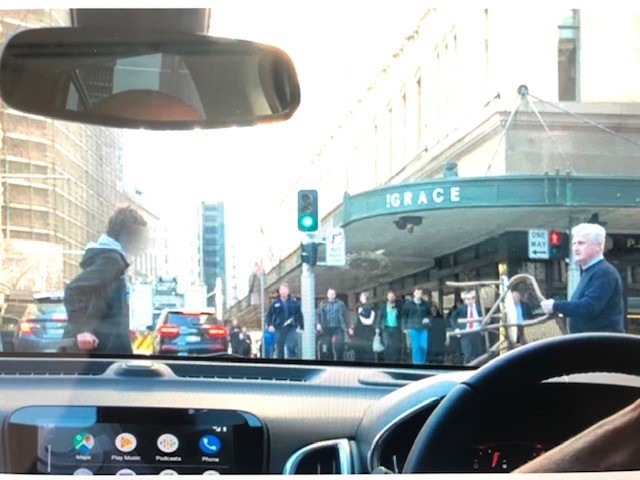Share This Article
It is reported that a man with a large knife in Sydney CBD has allegedly attempted to stab people on Tuesday.
Causing the Sydney CBD to go into lockdown, the incident unfolded close to the corner of Clarence and King Street when a man who was reportedly armed with a machete went on a stabbing rampage.
It is alleged that the man stabbed a woman in the back, which caused her to be hospitalised. She is now is a stable condition.
Detective Superintendent Gavin Wood has said that “the investigation is in its infancy, there’s a lot to be done”.
“We will allege the offender has attempted to stab multiple people, luckily unsuccessfully… We don’t know the causation or the rationale for the attack.”
Luckily, there were no life-threatening injuries.
While there have been reports that the man had yelled “Allah Akbar”, there is no confirmed evidence of this so far.
“That is something that has been reported to me, but we certainly haven’t captured that as an evidentiary base. That’s part of our investigation, and we’ll be using that evidence as we move forward”.
While the man has been detained by police, police are conducting further investigations and proactive patrols. However, the area is believed to be of no further threat.
It has resulted in various crime scenes, causing road closures in the CBD area. This has caused tremendous strain on traffic in the area. Buses are also required to divert routes.
The Citizens Arrest
A witness has said, “a random dude just started stabbing people in the city right outside where we were having lunch. I saw people running so I ran towards him with a few other guys.”
“He ran all the way back to near my work where a lot of others had cornered him for the police”.
There are reports of three individuals in particular who have been labelled by the police as heroes.
The three men have tackled the man with a milk crate and a chair soon after a woman was stabbed.
Witness Paul O’Shaughnessy is reported saying that his brother assisted in taking the man down.
“We had the windows slightly open and we heard a big kerfuffle and shouting… and my brother said there’s a guy holding a knife, and there was a bit of blood and he said come on this is it”.
Paul also said that the man was yelling “radicalist things” while he was running through the city during the rampage.
Members of the public managed to take the man down and restrain him. This is in circumstances of footage depicting the man running around in the city with blood on him.
The footage shows the man on top of a car before jumping off. As the man jumps off, the footage shows the man being attacked with chairs by members of the public.
The footage then shows the man being chased by a group of men who managed to trip him over before restraining him down with a milk crate over his head.
Police arrived shortly after, who took the man into custody.
A witness reportedly said that the man appeared “mad” with “dark, bushy unclean hair. About 20 something years old… he looked to me like a man who was in distress, he looked like someone who was mad”.
The man was later taken into an ambulance and transported to hospital.
Unknown if there is any connection as yet, but police have also discovered a woman’s dead body in a nearby building.
The Law on Police Arrest in NSW
Normally, police officers can arrest a person without a warrant if the officer suspects on reasonable grounds that the person is or has committed an offence and if the police officer believes an arrest is reasonably necessary for any of the following reasons:
- To stop the person from committing or repeating an offence; or
- To stop the person from getting away; or
- For police to conduct enquiries to establish the person’s identity if it can’t be readily established or if the officer suspects on reasonable grounds that the identity information that was provided is false; or
- To ensure that the person will appear in court in relation to the offence; or
- To obtain property in the possession of the person if it’s connected with the offence; or
- To preserve evidence or prevent its fabrication; or
- To prevent harassment or interference with any person who might give evidence; or
- To protect the safety or welfare of any person (including the arrested person); or
- Due to the nature and seriousness of the offence.
This is outlined in section 99(1) Law Enforcement (Powers and Responsibilities) Act 2002 (NSW) (LEPRA).
After arresting a person, the police officer is required to take the person before an authorised officer such as a Magistrate or Judge as soon as is reasonably practicable to be dealt with according to law under section 99(3) LEPRA.
Once arrested, the police are allowed to detain the person for the purpose of investigating as to whether or not he/she committed the offence for which he/she has been arrested under section 99(4) LEPRA.
The Law on Citizens Arrest in NSW
Section 100 LEPRA give other members of the public (other than police officers) to arrest a person without a warrant if, also known as a citizen’s arrest:
- The person is in the act of committing an offence; or
- The person just committed an offence; or
- The person has committed a serious indictable offence for which the person hasn’t been tried for yet. A serious indictable offence is any offence carrying a maximum penalty of at least 5-years imprisonment.
However, a person who makes such an arrest is required as is reasonably practicable, to take the arrested person and any property found on him/her, before an authorised officer to be dealt with according to law.
When making an arrests, including a citizen’s arrest, reasonable force must be used to effect an arrest or to prevent the arrested person escaping after the arrest under section 231 LEPRA.
It is important to understand this, as excessive force may lead to an assault charge carrying heavy penalties against the person who attempted to make the citizen’s arrest. These charges can include common assault, assault occasioning actual bodily harm or grievous bodily harm.
Click here for an outline on what the prosecution is required to prove for a charge of causing grievous bodily harm or wounding.
In addition, a person who is being arrested by a citizen as a citizen’s arrest is entitled to be told the reason why, unless the reason is obvious, or the arrested person makes it impossible. This has been reflected in the case of Christie v Leachinsky [1947] 1 All ER 567, where Lord Du Parcq said:
“No citizen is bound to submit unresistingly to another citizen in ignorance of the charge made against him. For this reason, a citizen cannot be charged for resistance as the right to arrest and the duty to submit are correlative.”
Have a question?
Our criminal defence lawyers specialise in complex criminal charges.
Call our h24/7 hotline to arrange a free first appointment on (02) 8606 2218.









